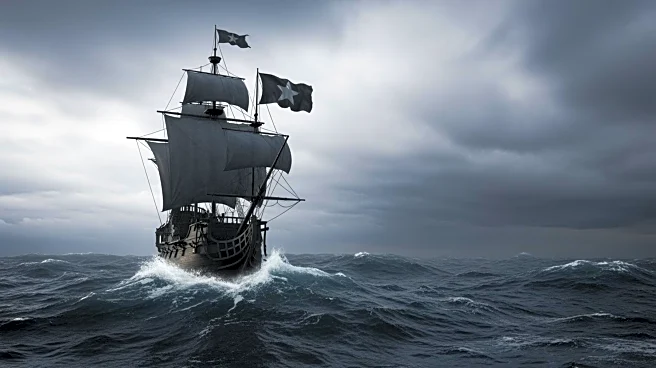What's Happening?
A Malta-flagged products tanker, Hellas Aphrodite, was boarded by pirates off the coast of Somalia, marking the highest tension escalation in the region since 2024. The vessel, carrying gasoline from India to South Africa, was attacked by armed assailants
who fired rocket-propelled grenades and machine guns. The crew of 24 took refuge in the ship's fortified safe room, known as the citadel, and are reported to be safe. Maritime security sources have identified the attackers as Somali pirates, who have also seized an Iranian fishing vessel to use as a mothership for launching further attacks. The European Union's naval force is in proximity to the incident and is prepared to respond effectively.
Why It's Important?
This incident underscores the persistent threat of piracy in the waters off Somalia, a region critical for global shipping lanes transporting energy and goods. The resurgence of piracy activities poses significant risks to international maritime trade, potentially leading to increased shipping costs and insurance premiums. The safety of crew members and the security of vessels remain paramount concerns for shipping companies operating in these waters. The involvement of Somali pirates, who have been relatively inactive in recent years, signals a potential shift in regional security dynamics, necessitating heightened vigilance and coordinated international naval efforts to safeguard maritime routes.
What's Next?
The European Union's naval force is actively monitoring the situation and is ready to take appropriate actions to address the piracy threat. Shipping companies may need to reassess their security protocols and consider rerouting vessels to avoid high-risk areas. International cooperation among naval forces could be strengthened to deter future piracy incidents. The maritime industry will likely advocate for increased security measures and support from governments to ensure the safety of crew members and the protection of commercial interests in the region.
Beyond the Headlines
The resurgence of piracy off the Somali coast may have broader implications for regional stability and economic development. It highlights the ongoing challenges in addressing maritime security in areas with limited governance and economic opportunities. The incident may prompt discussions on international efforts to support local communities and enhance economic prospects to reduce the allure of piracy. Additionally, the involvement of Iranian vessels as motherships could complicate geopolitical relations, necessitating diplomatic engagement to address underlying tensions.















